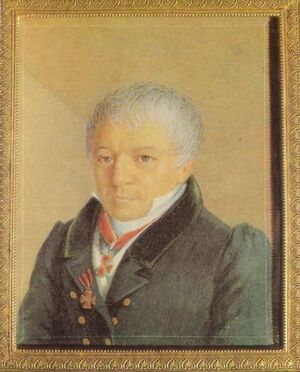Andrey Assier: Difference between revisions
m (Text replacement - "<br>" to "<br/>") |
No edit summary |
||
| (3 intermediate revisions by 2 users not shown) | |||
| Line 1: | Line 1: | ||
{{picture|file= | {{picture|file=Assier_Andrey.jpg|caption='''Andrey Assier''' (1778-1835)<br/>From an original portrait in the {{RUS-KLč}} at [[Klin]].}} | ||
Maternal grandfather of the composer (b. 26 December 1778 at Meissen, Saxony; d. 23 June/5 July 1835 in [[Saint Petersburg]]), born '''''Michael Heinrich Maximilian Acier''''', but known in Russia as '''''Andrey Mikhaylovich Assier''''' (Андрей Михайлович Ассиер). | Maternal grandfather of the composer (b. 26 December 1778 {{NS}} at Meissen, Saxony; d. 23 June/5 July 1835 in [[Saint Petersburg]]), born '''''Michael Heinrich Maximilian Acier''''', but known in Russia as '''''Andrey Mikhaylovich Assier''''' (Андрей Михайлович Ассиер). | ||
He was the son of [[Michel Victor Acier]] and his wife Maria Christina Eleonora (b. Wittig), and was brought to Russia in 1795 as a teacher of German and French for the [[Saint Petersburg]] Military School by the Russian general Pyotr Melissino. In 1800, by an oath of allegiance, Heinrich officially became a subject of the Imperial Crown and adopted the Russian name "Andrey Mikhaylovich Assier". He later served as a Customs and Ministry of Finances official, and was awarded the Order of Saint Vladimir (4th Class) and the Order of Saint Anne (2nd Class). | He was the son of [[Michel Victor Acier]] and his wife Maria Christina Eleonora (b. Wittig), and was brought to Russia in 1795 as a teacher of German and French for the [[Saint Petersburg]] Military School by the Russian general Pyotr Melissino. In 1800, by an oath of allegiance, Heinrich officially became a subject of the Imperial Crown and adopted the Russian name "Andrey Mikhaylovich Assier". He later served as a Customs and Ministry of Finances official, and was awarded the Order of Saint Vladimir (4th Class) and the Order of Saint Anne (2nd Class). | ||
In 1800 he married for the first time to [[Yekaterina Popova]] (1778–1816), and they had five children — Mikhail (b. 1802); [[Yekaterina Alekseyeva|Yekaterina]] (1805–1882); Nikolay (b. 1809); Andrey (b. 1811); and [[Aleksandra Tchaikovskaya|Aleksandra]] (1812–1854), mother of the composer. | In 1800, he married for the first time to [[Yekaterina Popova]] (1778–1816), and they had five children — Mikhail (b. 1802); [[Yekaterina Alekseyeva|Yekaterina]] (1805–1882); Nikolay (b. 1809); Andrey (b. 1811); and [[Aleksandra Tchaikovskaya|Aleksandra]] (1812–1854), mother of the composer. | ||
After his first wife's death in 1816 he married Amalia Grigoryevna Gogel, by whom he had two more children — Yelizaveta (b. 1823), and Pavel (b. 1824). | After his first wife's death in 1816 he married Amalia Grigoryevna Gogel, by whom he had two more children — Yelizaveta (b. 1823), and Pavel (b. 1824). | ||
Latest revision as of 10:53, 26 August 2023

From an original portrait in the Tchaikovsky State Memorial Musical Museum-Reserve at Klin.
Maternal grandfather of the composer (b. 26 December 1778 [N.S.] at Meissen, Saxony; d. 23 June/5 July 1835 in Saint Petersburg), born Michael Heinrich Maximilian Acier, but known in Russia as Andrey Mikhaylovich Assier (Андрей Михайлович Ассиер).
He was the son of Michel Victor Acier and his wife Maria Christina Eleonora (b. Wittig), and was brought to Russia in 1795 as a teacher of German and French for the Saint Petersburg Military School by the Russian general Pyotr Melissino. In 1800, by an oath of allegiance, Heinrich officially became a subject of the Imperial Crown and adopted the Russian name "Andrey Mikhaylovich Assier". He later served as a Customs and Ministry of Finances official, and was awarded the Order of Saint Vladimir (4th Class) and the Order of Saint Anne (2nd Class).
In 1800, he married for the first time to Yekaterina Popova (1778–1816), and they had five children — Mikhail (b. 1802); Yekaterina (1805–1882); Nikolay (b. 1809); Andrey (b. 1811); and Aleksandra (1812–1854), mother of the composer.
After his first wife's death in 1816 he married Amalia Grigoryevna Gogel, by whom he had two more children — Yelizaveta (b. 1823), and Pavel (b. 1824).
